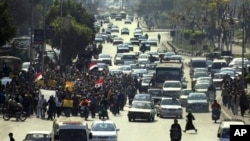Egypt’s military appears to be backing President Hosni Mubarak’s decision to remain in office and has called for a return to normal life in Cairo. The military also endorsed the transfer of some powers from Mr. Mubarak to Vice President Omar Suleiman.
The Egyptian military’s Supreme Council says it will lift the country’s emergency laws if the current protests end. Those laws have been in place for 30 years, giving Egyptian security forces extraordinary powers to arrest people and hold them indefinitely.
The military’s announcement is a huge concession to pro-democracy protesters flooding Egypt’s streets for an eight consecutive day. But it may not be enough.
Surprise decision
On Thursday, Mr. Mubarak surprised demonstrators, and observers around the world, by saying he would not step down.
Shock, dismay, and anger followed in Cairo’s Tahrir Square, where thousands of protesters had gathered for Mr. Mubarak’s speech. Shayma Kamel was there.
"He didn’t resign. He didn’t resign and the people are so disappointed and so angry," said Kamel.
She said protesters are marching Friday on Egypt’s presidential palace.
"[The] reaction is really bad. All of the people are so nervous, and they all - the people - decided to go to the president’s palace. They are so angry," Kamel said.
More protests planned
Demonstrators are also gathering outside the offices of Egypt’s state television, the mouthpiece of Mr. Mubarak’s government.
Opposition leader Mohamed ElBaradei warned on Twitter that Egypt will "explode."
Friday's demonstration is already one of the largest yet. Protesters are joining with millions of Egyptians flowing out of mosques after Friday prayers. In Tahrir Square, a top Muslim preacher has called on the protesters to stay steadfast in their demands. The man fainted with emotion in the middle of his sermon.
Mubarak Timeline




